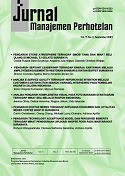ANALISA E-SERVICE QUALITY TERHADAP REPURCHASE INTENTION MELALUI CUSTOMER E-SATISFACTION SEBAGAI VARIABEL INTERVENING PADA PEMBELIAN ONLINE DI ZALORA INDONESIA
 :
:
https://doi.org/10.9744/jmp.7.2.75-83
Keywords:
Electronic Service Quality, Repurchase Intention, Customer Electronic SatisfactionAbstract
The development of e-commerce is increasing in Indonesia which has caused people to switch to making transactions through e-commerce. This research aims to analyze the effect of e-service quality on repurchase intention through customer e-satisfaction as an intervening variable on online purchases at Zalora Indonesia. This research uses quantitative methods. The sampling technique used was purposive sampling. The respondents of this research are consumers who have made transactions more than once. The data is processed using the structural model equation approach with the Partial Least Square technique. The results of this research indicate that e-service quality affects customer e-satisfaction. Customer e-satisfaction affects repurchase intention and e-service quality. E-service quality influences repurchase intention through customer e-satisfaction.
Abstrak
Pimpinan perusahaan memiliki tanggung jawab meningkatkan kinerja karyawan dengan meningkatkan keterlibatan karyawan pada pekerjaan. Gaya kepemimpinan yang tepat dinilai akan mampu meningkatkan kinerja karyawan karena menyebabkan karyawan merasa termotivasi. Tujuan penelitian ini adalah menjelaskan pengaruh servant leadership terhadap kinerja karyawan melalui employee engagement pada Restoran Shaburi & Kintan Buffet di Surabaya. Jenis penelitian adalah penelitian kuantitatif, variabel penelitian meliputi: servant leadership, employee engagement, dan kinerja karyawan. Jumlah sampel sebanyak 60 karyawan. Teknik pengumpulan data menggunakan kuesioner. Teknik analisis data menggunakan structural equation model dengan program PLS. Temuan penelitian ini menunjukkan: servant leadership berpengaruh secara langsung terhadap employee engagement, tetapi tidak berpengaruh secara langsung terhadap kinerja karyawan. Employee engagement berpengaruh secara langsung terhadap kinerja karyawan. Employee engagement adalah variabel yang memediasi pengaruh servant leadership terhadap kinerja karyawan.
References
Adelaar & Thomas. (2000). “Electronic Commerce and Implifications for market Structure: The Example of the Art and Antiques Trade’’. Journal of Computer Mediated Communication, 5(3).
Cronin. Jr, J & Taylor, Steve. (1992). Measuring Service Quality-A Reexamination and Extension. The Journal of Marketing. 56, 55-68
Dabholkar, P. C., Stepherd, D., & Thorpe, D. I. (2000). “A Comprehensive Frawork for Serivce Quality: An Investigation of Critical Conceptual nd Measurement Issues Through a Longitudinal Study”. Journal of Retailing, 76(2), 139-73
Dolatabadi, H. R. dan Gharibpoor, M. (2012). How Can E-Service Influence on Customers Intentions toward Online Book Repurchasing (SEM Method and TPB Model). International Journal of Academic Research in Business and Social Sciences. 2(6), 2222-6990.
Ferdinand, A. (2014). Metode Penelitian Manajemen. Semarang: Badan Penerbit Universitas Dipo-negoro.
Fornell, C. (1992). A National Customer Satisfaction Barometer: The Swedish Experience. Journal of Marketing, 56, 6-21.
Gupta, S. dan Kim, H. (2010). Value-Driven Internet Shopping: The Mental Accounting Theory Per-spective. Psychology & Marketing, 27(1), 13-35.
Ha, Young & Stoel, Leslie, (2004). Internet apparel shopping behaviors: the influence general innovativrness. Journal od Retail & Distribution Management. 32(8).
Hellier, Phillip K., et al. (2003). “Customer repurchase intention: A general structural equation model”. European Journal of Marketing, 37(11/12), 1762-1800
Hsin Hsin, Chang., Yao-Hua, Wang., & Wen-Yin, Yang. (2009). The impact of e-service quality, customer satisfaction and loyalty on e-marketing: Moderating effect of perceived value, Total Quality Management & Business Excellence. 20(4), 423-443, doi:10.1080/14783360902781 923.
Khalifa, M., & Liu, V. (2007). Online consumer retention: Contingent effects of online shopping habit and online shopping experience. European Journal of Information Systems.
Kotler, P., & Keller, K. L. (2012). Marketing Management (14th ed.). New Jersey: Prentice Hall.
Lupiyoadi, Rambat, A. Hamdani (2008). Manajemen Pemasaran Jasa. Cetakan Keempat. Jakarta: Salemba Empat.
Malhotra, N, K. (2004). Marketing research: An applied orientation (4th ed.). New Jersey: Upper Saddle River.
Ranjbarian, B., Fathi, S., & Rezaei, Z., (2012). Factors Influencing on Customers’ E-Satisfaction: A case Study from Iran, Journal of contemporary research business, Vol. 3(9).
Rust, R.T. and Oliver, R.L. (1994). Sevice Quality: New Dimension in Theor and Practice. Nebury Park, CA: Sage Publication.
Santoso, A., & Aprianingsih, A. (2017). The influence of perceived service and e-service quality to repurchase intention the mediating role of custo-mer satisfaction case study: Go-ride in Java. Jour-nal of Business and Management, 6(2), 41-42.
Siwantara, I. W. (2011). Pengaruh nilai pelanggan terhadap kepuasan dan loyalitas pelanggan serta kinerja customer relationship management (Studi pada Halo Corporate PT Telkomsel Bali). Jurnal Bisnis dan Kewirausahaan, 7(3), 150-161.
Sugiyono. (2010). Metode Penelitian Pendidikan Pendekatan Kuantitatif, kualitatif, dan R&D. Bandung: Alfabeta.
______. (2015). Metode penelitian kuantitatif, kualitatif dam r & d. Bandung: Alfabeta.
Suwarman, Ujang. (2011). Perilaku Konsumen Teori dan Penerapannya dalam Pemasaran Edisi 2 Cetakan 1. Jakarta: PT Ghalia Indonesia.
Thongsamak S. 2001. Service Quality: Its measurement and relationship with customer satisfaction. Journal of Service Marketing. 14/1, pp. 9-26.
Tjiptono, F & Chandra, G. (2011). Service, Quality & Satisfaction (Edisi 3). Yogyakarta: Pt. Andi.
Turban, E., King, D., Lee, J. K., Liang, T-P, & Turban, D. (2012). Electronic Commerce: A Managerial and social Networks Perspective 2012. In Commerce A Managerial Perspective (5th ed)
Wibowo. (2013). Manjemen Kinerja. Jakarta: Rajawali Pers.
Zeitaml, Valerie A, dan Bitner. (2000). Service Marketing: Integrating Customer Focus (2nd ed.), New York: McGraw Hill Inc.


















